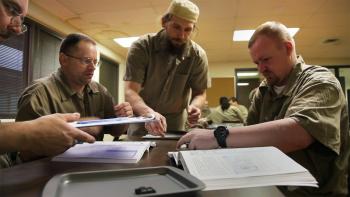Metropolitan Community College has ‘front seat to watching miracles come to life’
Metropolitan Community College has ‘front seat to watching miracles come to life’
FOR IMMEDIATE RELEASE (18-01)
CONTACT Cara Wilwerding, Communications Manager
OFFICE 402-479-5712 | cara.wilwerding@nebraska.gov
Note: This is the sixth of an eight-part series about Vocational and Life Skills programs funded by LB907. Follow along to learn more about the programs’ goals, expectations and successes.
Jan. 3, 2018 (Lincoln, Neb.) – Finding suitable employment after incarceration is a difficult task. It’s a task made even more difficult when candidates don’t believe they have a proper education or skillset. Metropolitan Community College (MCC) is making significant strides in educating, training and inspiring what they call the “hidden workforce.”
MCC’s 180 Re-entry Assistance Program (RAP) provides evidence-based reentry education, training, job placement assistance, peer mentoring and student supports to currently incarcerated and recently released individuals. Their main goal is to connect the population to survival (immediate) and gainful (long-term) employment opportunities.
“Every day I feel like we have a front seat to watching miracles come to life,” said Diane Good Collins, 180 RAP program director.
While MCC has been providing education inside locked facilities for years, the 180 RAP program was formalized in February 2015. They now offer classes at the Omaha Correctional Center (OCC), Community Correction Center-Omaha (CCC-O), Nebraska Correctional Youth Facility (NCYF), Nebraska State Penitentiary (NSP), Tecumseh State Correctional Institution (TSCI) and Nebraska Correctional Center for Women (NCCW). As of Nov. 17, 2017, 180 RAP had served more than 2,500 individuals.
Good Collins said the majority of 180 RAP staff members have a criminal history, which gives them first-hand experience to model peer mentoring. Staff members’ knowledge and empathy help ensure that participants achieve their education and employment goals, and dramatically increase participant success.
“I believe our greatest successes to date are when we get to witness and share in the journey of those who are working diligently to get out and stay out of prisons and jails,” Good Collins said. “Seeing our program participants mentor others in our program is a tremendous success as well.”
Through their work readiness and life skills training opportunities, participants may take college credit classes in business and entrepreneurship, college and career preparation, trades and information technology. Noncredit offerings include forklift training, employability skills, welding, budgeting, career planning, reintegration planning, financial literacy and digital literacy. Some of these classes may last an entire year, while other workshops can be completed in just one day.
“Goals are realized through completing work readiness and life skills trainings, where students begin to see that they need to get on a level playing field with those in the workforce who do not have a criminal history,” Good Collins said. “They choose to invest in themselves and soon realize that education is the foundation for their new life.”
Furthering this foundation is 180 RAP’s Long Term Relief group. Long Term Relief provides specialized support to individuals housed at CCC-O who have been incarcerated for 10 or more years and/or have served multiple sentences. These individuals come to MCC’s Fort Omaha Campus (FOC) every week to engage with community organizations who teach them tactics to overcome barriers upon release.
“Watching our Long Term Relief participants prepare to enter the community after being incarcerated for decades, being released and then doing well after many months in the community is when I realize we are doing exactly what we are supposed to be doing – providing other members of our community with a hand up, not a hand out,” Good Collins said.
Recently released individuals and probationers have ongoing direct support available to them at the MCC North Express and FOC. They also offer a referral program called Wrap Around Support. This program helps individuals locate programs to facilitate with stabilizing factors such as housing, food, clothing, medical necessities and mental health.
Individuals going through 180 RAP programming may earn a National Career Readiness Certification (NCRC), which displays to potential employees that the candidate is work ready. 180 RAP also works with area employers who are willing to hire individuals with a criminal history, and Good Collins said they are growing and strengthening these partnerships every day.
“MCC is addressing all facets of reentry,” said Steve Fannon, Nebraska Department of Correctional Services (NDCS) reentry program manager. “They celebrate each other’s success and help each other through their griefs and trials. It’s placing a value on education that we’ve always strived for.”
###

